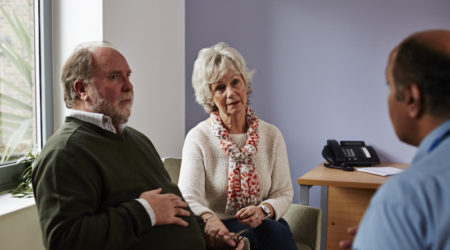Second opinion
You can ask for a second opinion from a different doctor, if you want one. You don’t have a legal right to a second opinion, but most doctors will help you get one, if you ask for one. Don’t delay your treatment while you get a second opinion, as it can take several weeks.
Treatment for pancreatic cancer as soon as appropriate
You should receive treatment for pancreatic cancer as soon as the doctors have finished tests to work out the stage of your cancer and the best treatment options for you. The stage describes the size of the cancer and whether it has spread.
Your first treatment should begin within 31 days of agreeing with your doctor what treatment you will have.
The NICE guidelines recommend faster treatment in some situations. For example, the guidelines recommend that people who can have surgery but have jaundice should be offered surgery, rather than having a treatment for jaundice first – as long as they are fit enough for surgery. Read more about this NICE recommendation.
Holistic Needs Assessment
You should be offered a holistic needs assessment at key points in your care. During the holistic needs assessment, your nurse will discuss a range of things with you, including any physical, emotional, spiritual or practical issues. They should then develop a care plan for you, which should include managing any of these issues.
Diet and nutrition and pancreatic cancer
You should be given advice and support to manage problems with eating and symptoms related to diet and nutrition. Pancreatic cancer and its treatment can affect how well your pancreas produces the enzymes which help you digest (break down) food. This can cause symptoms which can be treated with pancreatic enzyme replacement therapy. These help to digest food and can make a big difference to how you feel.
Soon after your diagnosis you should be given information about diet and managing any symptoms you have. You should also be given enzyme supplements and be told how to take the enzyme supplements properly, so that you are confident doing this.
You should see a dietitian, and ideally a specialist dietitian who is an expert in diet and cancer. They can assess your symptoms and diet, and provide expert advice tailored for you.



